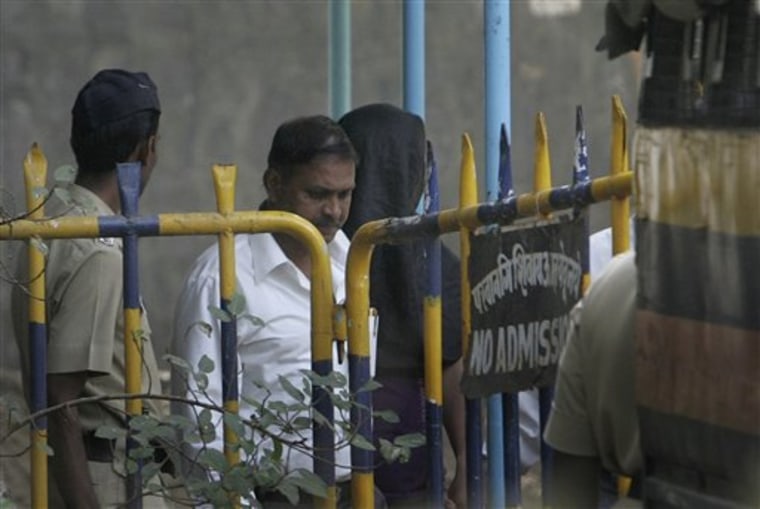Cricket is one of the few things India and Pakistan agree on. But with New Delhi accusing Islamabad of not curbing Pakistani-based terrorists blamed for the Mumbai attack, India on Thursday canceled a cricket tour to Pakistan — a clear sign of a freeze in relations.
In the decades since gaining independence from Britain in 1947, Pakistan and India have fought three wars and teetered on the brink several more times. Yet cricket is a national obsession for both countries and has helped thaw tensions.
India's national cricket team went to Pakistan in 2004 for the national teams' first full series of matches in 14 years, a trip hailed as an optimistic sign as the nuclear-armed rivals got a fledgling peace process going.
That has been undone by last month's Mumbai assault, which left 164 people and nine of the 10 attackers dead. Relations are strained again and the peace process is on ice.
India alleges a Pakistan-based Islamic group, Lashkar-e-Taiba, sponsored the attacks on hotels, a train station and markets in the country's financial capital and has demanded that Islamabad move against the militants.
Frayed relations
Pakistan has arrested some suspects and clamped down on a charity, Jamaat-ud-Dawa, purportedly linked to the previously outlawed Lashkar. But officials say that to do more, they need evidence of the group's complicity — a demand India says it cannot fulfill until the investigation is over.
In another sign of worsening tensions, Pakistan summoned an Indian envoy Thursday to formally complain about violations of its airspace over the weekend — an abrupt about-face after earlier playing down the alleged breaches by Indian aircraft as not deliberate.
India's deputy ambassador, Manpreet Vohra, said he would pass along the complaint. But, Vohra told The Associated Press, "our government, after holding an inquiry, has already said that there was no airspace violation from our side, and I reiterated this stance today."
India, meanwhile, test-fired its Brahmos supersonic cruise missile, saying it wanted to check a new ship-borne launch system.
Amid the ill feelings, cricket became the first diplomatic casualty.
Cricket: Something people notice
"This is the Indian government saying (to Pakistan) that 'We're severely displeased and you must to do something if you want to continue normal relations,'" said analyst Prem Shankar Jha. "It's showing displeasure in a manner that people really will notice."
He said India's leaders are under public pressure to get tough. "No one in India trusts Pakistan right now, and to send a cricket team would be seen as complete trust in the Pakistan government," he said.
The Board of Control for Cricket in India called the tour "not feasible in the prevailing circumstances."
India cricket player Anil Kumble called it a good decision. "We had known that we won't be traveling to Pakistan under the present situation," he told the Press Trust of India news agency.
Pakistan's cricket authority said it bore no ill will toward its Indian counterpart.
"We are still on normal terms with BCCI because it was a decision neither in their nor in our hands. They have also said that if the situation gets normal in the future, it would send its team to Pakistan," said Salim Altaf, head of the Pakistan Cricket Board.
But Pakistanis expressed disappointment.
"It's a big disappointment and a setback to Asian cricket," former player Sarfraz Nawaz told the AP in Islamabad. "The terrorism acts could happen anywhere in the world, but that does not mean that sports activities should come to a halt."
Suspects detained
In the upper house of India's Parliament, lawmakers debated legislation to overhaul the country's legal and security apparatus in light of glaring gaps in security and intelligence revealed by the Mumbai attack.
One bill passed unanimously Wednesday by the lower house would give police sweeping powers to detain terrorism suspects and carry out searches, while a second measure would create an FBI-style national investigation agency.
"It will only have a modest impact," said C. Uday Bhaskar, former director of India's Institute of Defense Studies and Analyses. "India needs many structural changes. ... It is only after a terrorist activity occurs that these measures take effect."
In Mumbai, a judge ordered two Indian citizens suspected of aiding the attackers kept in police custody until Dec. 31.
Prosecutors say one man, Faheem Ansari, had maps of the sites attacked in Mumbai, and police say the other, Sabauddin Ahmed, guided gunmen across India's porous borders. They were jailed last February after an attack on a police station in northern India.
"How they helped, what kind of help they gave the terrorists — this is what we have to investigate," prosecutor Eknath Dhamal told the court. "Police need more time."
The alleged involvement of its own citizens has been a blow to India, which has tried to portray the attack as being entirely orchestrated from Pakistan.
